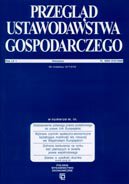Przegląd Ustawodawstwa Gospodarczego nr 09/2012
Rok wydania: 2012
Miejsce wydania: Warszawa
Oprawa: miękka
Przegląd Ustwodawstwa Gospodarczego nr 9/2012
Spis treści
Anna Walaszek-Pyzioł, Uniwersytet Jagielloński
ENTSO E - nowa forma instytucjonalnego współdziałania w celu stworzenia wspólnego rynku energii elektrycznej na obszarze Unii Europejskiej
Summary
ENTSO-E – a new form of institutional co-operation in order to create common electricity market in EU region
ENTSO-E (European Network of Transmission System Operators for Electricity) is an assotiation (established in 2009) amalgamating transmission system operators for electricity from EU-countries. One of the main tasks of ENTSO-E is preparing of network codes (s.c. grid codes) which regulate in detail legal principles of international exchange of electricity (common market) .The article consists problems of legal ENTSO-E status on the basis of EU-law. The special attention is given to the problem of the role of ENTSO-E in establishing of transeuropean grid codes.
Michalina Duda, Katolicki Uniwersytet Lubelski Jana Pawła II
Podatek akcyzowy od wyrobów alkoholowych w państwach Unii Europejskiej. Projektowane scenariusze zmian
Summary
Excise duty on alcoholic beverages in European Union Member States. Proposed scenarios for changes
In 2009 the European Commission initiated a subsequent stage of work on changing the principles concerning the taxation of alcoholic beverages. For this purpose the experts from London Economics LLC were commissioned creating a report assessing the currently-binding regulations from the perspective of the operation of the Single Market. The report indicated several problems connected with the current system of excise taxation of alcoholic beverages and also presented scenarios of solutions aiming to either modify the level of minimum excise rates on individual categories of alcoholic beverages or to change the structure of individual categories of these beverages.
The primary aim of his article is to present the currently-binding provisions of Community law concerning the levels of excise rates on alcohol beverages, the structure of rates applicable in each Member State and also the scenarios of changes proposed at the Community level.
Jakub Kociubiński, Uniwersytet Wrocławski
Prywatyzacja zadań władzy publicznej w świetle unijnego prawa konkurencji
Summary
Privatisation of public service tasks in the light of EU competition law
The State administration which in constitutional sense is ultimately responsible for fulfilling needs of the society may not always be able to meets these needs adequately and efficiently. Therefore it become increasingly common to entrust private entities in provision of these public service tasks. This process – which axiological foundations are rooted in the concept of Gewährleistungsstaat – redefines the role of the State and raises particular challenges regarding division of powers between European Union and the Member States.
This paper tackles the issue of privatisation of public tasks in three main aspects. When the performance of public tasks could be considered as economic activity and thus its operator be subject of EU competition law. When entity which is organisationally external from the State, in a broad sense, could be regarded as an Emanation of the State and therefore be excluded from the scope of the EU law. Services of General Economic Interest – a communautaire category of services - forms the third element of the described issue.
KONSULTACJE
Paweł Lewandowski, Uniwersytet Warmińsko-Mazurski w Olsztynie
Indywidualna praktyka lekarska jako rodzaj regulowanej działalności gospodarczej
Summary
Individual medical practice as a type of regulated business activity
The Act on Freedom of Business Activity regulates business. Subjects are obliged to apply the intention to start conducting business-related activities and to fulfil special requirements. One such activity is running an individual medical practice, as stated in the Act dated 15 April 2011 on Medical Activity. Special requirements essential to running an individual medical practice include: owning the right to undertake a profession, lack of decisions that forbid running it or making impossible the performance of any specific actions, finding accommodation, entry in a register, and the obligation to contract civil liability insurance. This activity can be started after receiving entry to a medical activity subject register, which is kept by regional medical boards. Such strict requirements are the result of the important character of such protected goods as life and health.
It will be necessary to restrain individual medical activity in permission form. According to binding law regulations, the preliminary control to fulfil material conditions is possible. Large discrepancies regarding classically regulated business activity settle in articles 64 - 74 in the Act on Freedom of Business Activity and regulation of the Act on Medical Activity, making conduct of this type of activity closer to the permission model.
| Inpost Paczkomaty | 14 zł |
| Kurier Inpost | 14 zł |
| Kurier FedEX | 14 zł |
| Odbiór osobisty | 0 zł |
| Darmowa dostawa | od 250 zł |
| Darmowa dostawa w Klubie Książki | od 200 zł |

